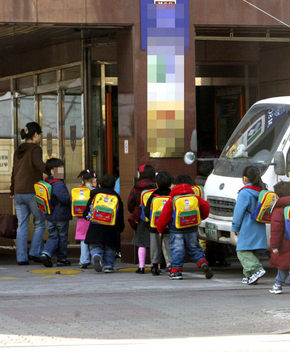Posted on : Jan.6,2007 14:43 KST
Modified on : Jan.15,2007 15:09 KST
 |
|
A group of kindergarteners going to take an English class in Seoul.
|
Number of young students sitting for language tests increasing
With the tendency growing for South Koreans to start English classes from early childhood, more and more kindergarteners are now sitting for competitive English tests. Such a situation is resulting in normal kindergartens establishing special classes for English test preparation, as well as the writing of English tests exclusively designed for kindergarteners.
In the case of the Primary English Level Test - Junior (PELT-Junior), which has been conducted since 1995 for elementary school students in the third grade or higher, the number of applicants has shown an upward curve since 2000, with about 60,000 test-takers in 2001, 140,000 in 2002, 250,000 in 2004, and 260,000 in 2006. The industry estimates that about 1-2 percent of these test-takers are kindergarteners aged seven or younger.
The number of applicants for Junior English Test (JET), which is provided by the Korea TOEIC Committee for elementary students, reached more than 65,000 in 2006 from 25,000 in 2004 and 50,000 in 2005. Almost 4 percent of these test-takers are kindergarten-age children, according to the TOEIC committee.
Over 2,000 children took the first "PELT Kids" test, designed for the kindergarten level, which was conducted in September last year. This test is due to be held four times annually beginning this year. In addition, a considerable number of children aged six or seven are reportedly taking other English tests from the United States, such as the Lexile, Stanford, and Junior General Tests of English Language Proficiency (Jr. G-TELP) tests.
Due to such English-testing fever seen in kindergarten children - or, rather, their parents - more and more kindergartens or private English institutes ("hagwon" in Korean) have been running special classes in preparation for these tests.
Such an increase in very young applicants for English tests reflects the mentality of parents who want to confirm the ability of their children’s English and to arouse motivation, according to Lee Seok-jae, a professor of Yonsei University. Moreover, a pilot program that began last year, which starts English education in the first grade in Korean elementary schools, may have incited the parents’ obsession, many observers said. English instruction in most Korean schools begins in the third grade.
Won Yu-sun, a teacher at Ilsin Elementary School in Incheon, said, "The English tests may boost children’s motivation to study the language. However, if they suffer from over-instruction since early childhood, they may lose interest in English."
Please direct questions or comments to [englishhani@hani.co.kr]

